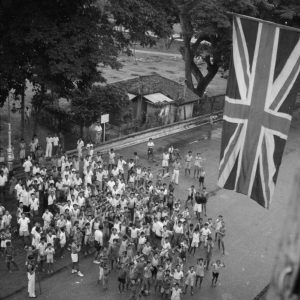Bringing the International and Transnational back in: Singapore, Decolonisation, and the Cold War
November 8, 2021

Held annually on 9 November, World Freedom Day commemorates the fall of the Berlin Wall nearing the end of the Cold War in 1989, a historic event that heralded a freer, fairer, and united Germany. Similarly, Singapore’s decolonisation experience, which brought greater freedom and autonomy to its people, intersected with political and ideological forces unleashed by Cold War affairs and players. Associate Professor Joey Long (NUS Department of History), in his chapter, ‘Bringing the International and Transnational back in: Singapore, Decolonisation, and the Cold War’ (Singapore in Global History, 2011), outlines one such episode, where British strategic considerations during the Cold War contributed to the decolonisation process in Singapore.
A/P Long argues that British participation in the Southeast Asia Treaty Organisation (SEATO) – designed to thwart communist expansion into SEA amidst the Cold War – encouraged the British to incrementally grant Singapore self-governance in order to secure Britain’s right to use Singapore as a military base. Such political concessions were made by the British so as to not incur the wrath of local nationalists, especially given anti-imperialism sentiments after the British attempt to seize the Suez Canal in 1956. A/P Long also posits that that the timing of the Suez Crisis accompanied by Lim Yew Hock’s anti-communist credentials were factors in explaining Lim’s success in securing greater internal self-governance as compared to David Marshall.
A/P Long points out that Singapore’s history is bound up with world history and has been shaped by global historical events. For instance, Britain’s retreat from its Singaporean colony relates to circumstances of the Cold War and the demands of Singaporean politicians who were eager to taste new constitutional freedoms. A/P Long’s argument also shows that local politician Lim Yew Hock – in contrast to historical studies that depict him as a politically naïve and one-dimensional character – was shrewd enough to leverage international trends for domestic gain.
Find out more about the book here.
